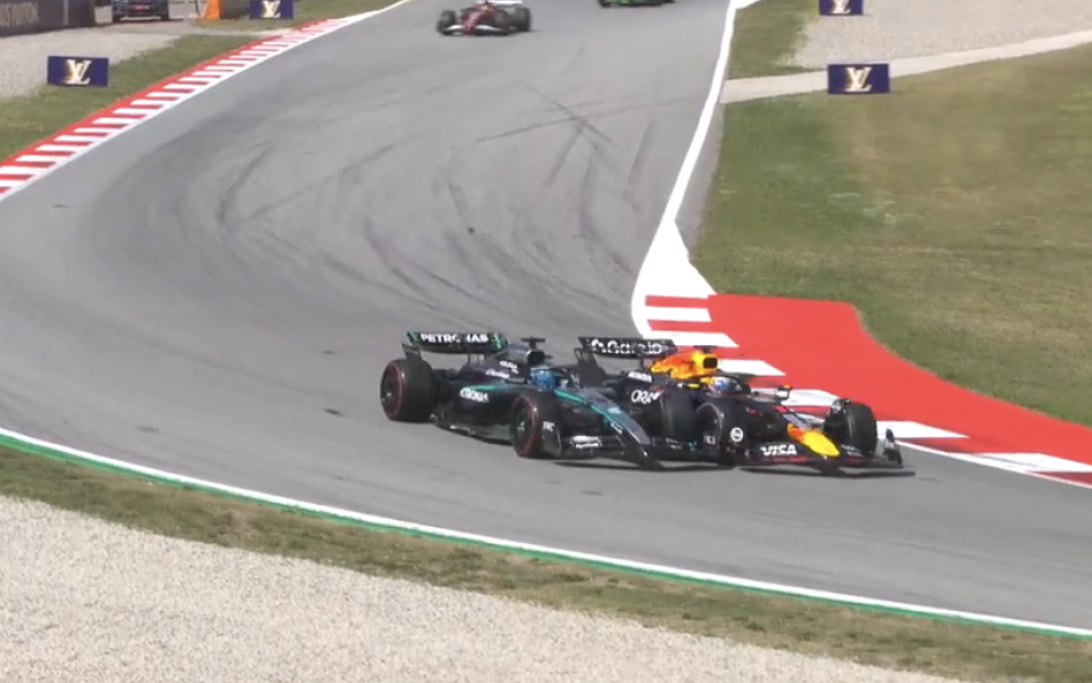Sparks Fly: Verstappen and Russell's Spanish GP Clash Reignites Rivalry
The long-simmering tension between Max Verstappen and George Russell boiled over at the Spanish Grand Prix, resulting in a controversial collision and heated exchanges.
Wiktor Forsström
F1 Journalist

The Spanish Grand Prix weekend was overshadowed by a dramatic collision between Max Verstappen and George Russell, reigniting their long-standing rivalry and providing one of the season's most controversial moments. This, of course, played out following Russell and Verstappen's squabble towards the end of the 2024 season, and either side of their controversial clash at this year's Spanish Grand Prix, which yielded an apology from the latter.
History of Tension
The relationship between Verstappen and Russell has been complicated since their early encounters in junior categories. Verstappen and Russell have been involved in more on- and off-track dramas this season, with their latest clash serving as the most significant flashpoint yet.
Their rivalry has often been characterized by strong words and aggressive racing, with neither driver willing to concede ground when wheel-to-wheel combat ensues. The intensity of their competition reflects both drivers' championship ambitions and unwillingness to accept defeat.
The Spanish Incident
The collision occurred during a crucial phase of the Spanish Grand Prix, when Max Verstappen of Red Bull Racing soon collided with George Russell after the race resumed. The incident effectively ended both drivers' chances of a strong result and triggered immediate recriminations from both camps.
Verstappen's subsequent apology marked a rare moment of contrition from the four-time world champion, acknowledging that his actions had contributed to the incident's severity. The apology suggests recognition that the rivalry had perhaps escalated beyond acceptable limits.
Championship Implications
For Verstappen, any lost points are particularly costly given Red Bull's struggles to match McLaren's consistent pace this season. The Dutchman's championship defense has been hampered by both mechanical issues and strategic errors, making every scoring opportunity crucial.
Russell's involvement in the incident also damaged Mercedes' hopes of maximizing their points haul at a circuit where they had shown competitive pace. The collision highlighted the fine margins that separate success from failure in Formula 1's highly competitive current environment.
Regulatory Response
The stewards' investigation into the incident focused on determining responsibility and appropriate penalties. The outcome of such decisions often influences how similar situations are handled in future races, making precedent an important consideration.
The FIA's handling of driver conduct and on-track incidents continues to evolve, with officials seeking to balance competitive racing with safety requirements and sporting fairness.
Psychological Warfare
The rivalry between Verstappen and Russell extends beyond simple racing incidents to encompass broader psychological battles. Both drivers are known for their mental strength and refusal to be intimidated, creating volatile situations when they encounter each other on track.
Their public statements following incidents often reveal the depth of their competitive animosity, with neither willing to accept blame or show weakness to their rival.
Future Encounters
With several races remaining in the 2025 season, further encounters between Verstappen and Russell seem inevitable. Their rivalry adds an extra dimension to already complex championship battles, potentially influencing outcomes through their interactions.
Both drivers will need to find ways to compete aggressively while avoiding costly mistakes that could damage their respective championship campaigns. The balance between attack and restraint will be crucial in their future encounters.
Team Dynamics
The rivalry also impacts their respective teams, who must balance supporting their driver while avoiding escalation of conflicts that could harm their championship aspirations. Team principals often find themselves in difficult positions when managing such situations.
The incident serves as a reminder of how individual rivalries can influence team strategies and championship outcomes, demonstrating the interconnected nature of modern Formula 1 competition.